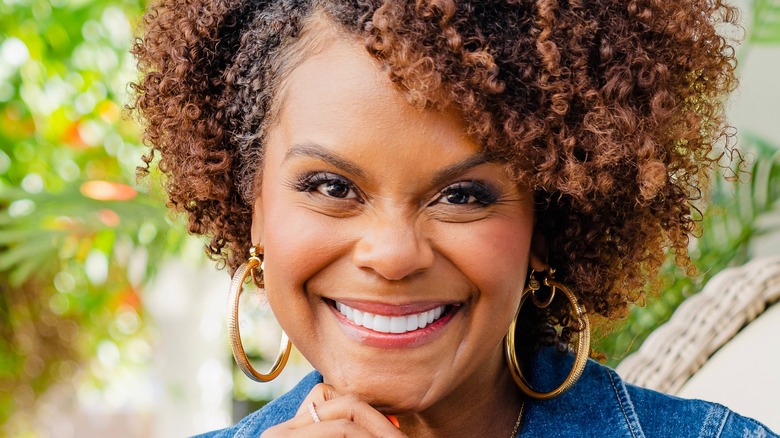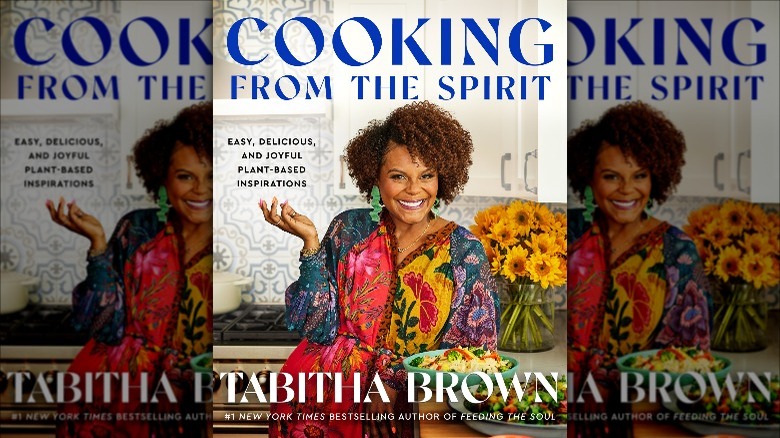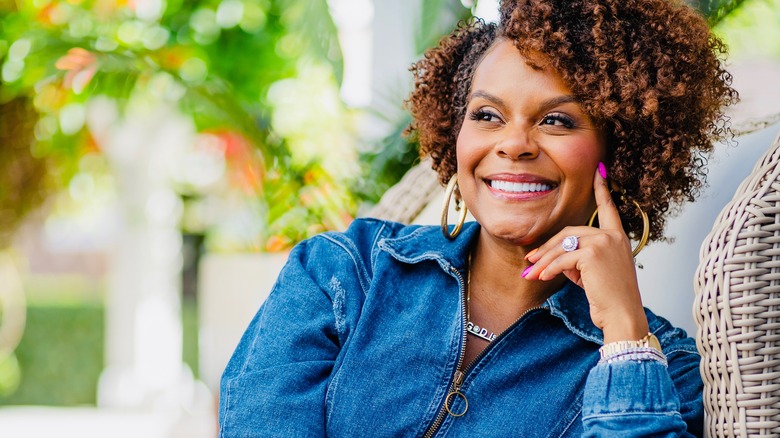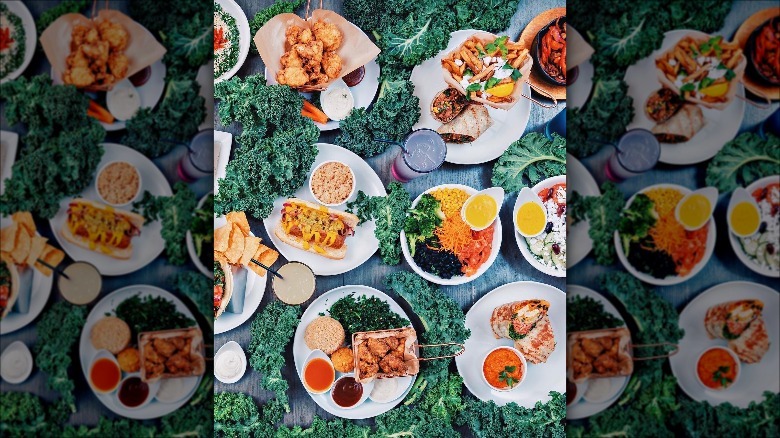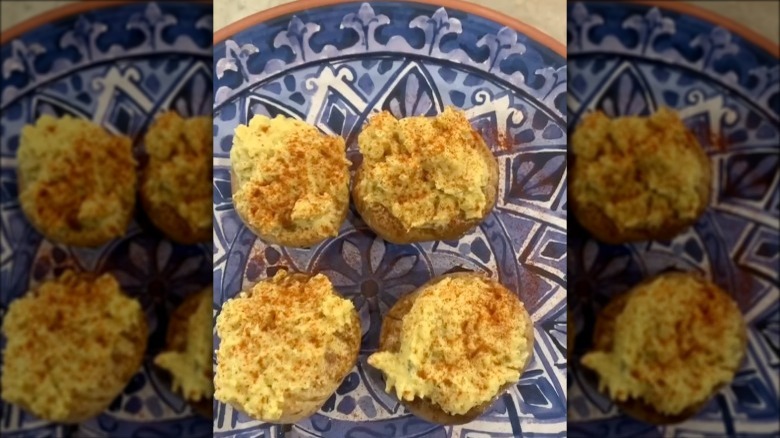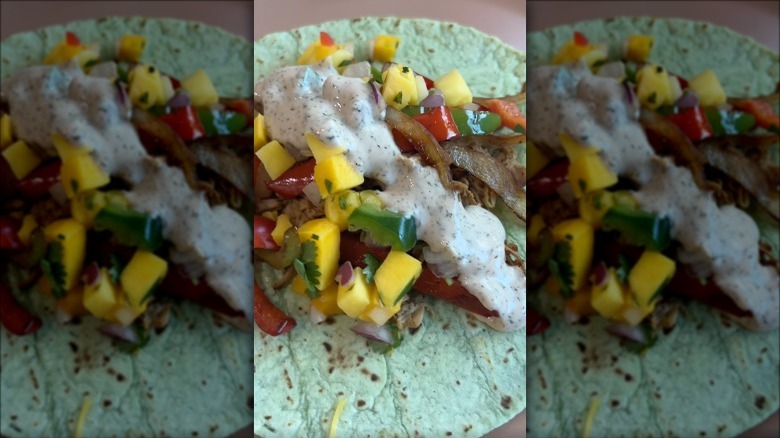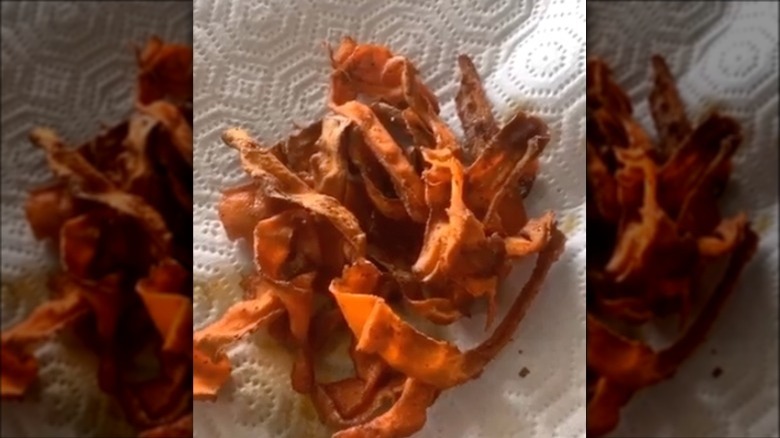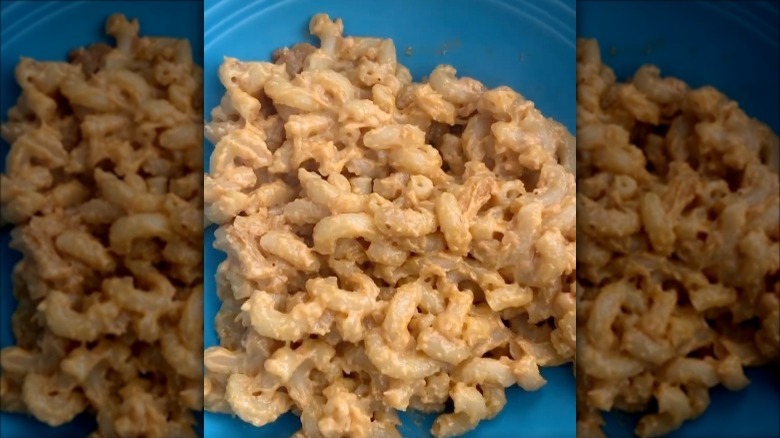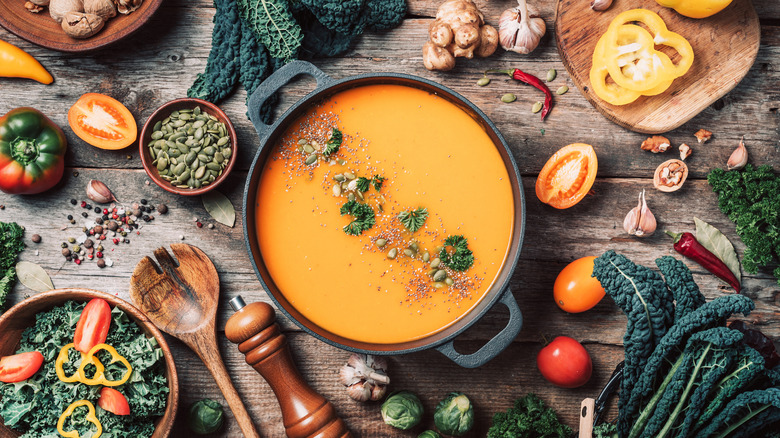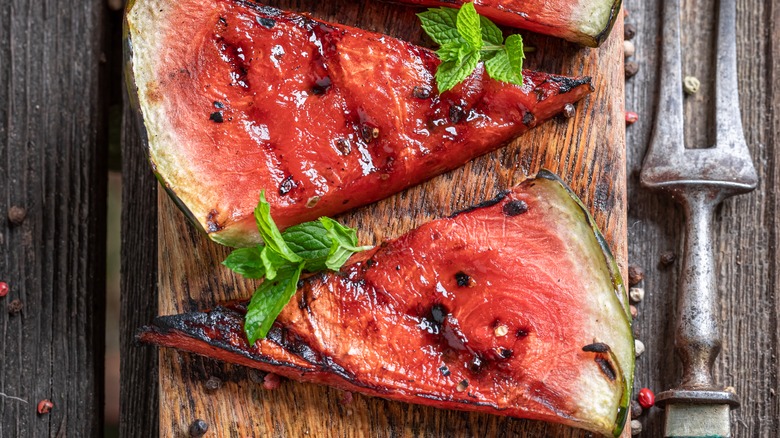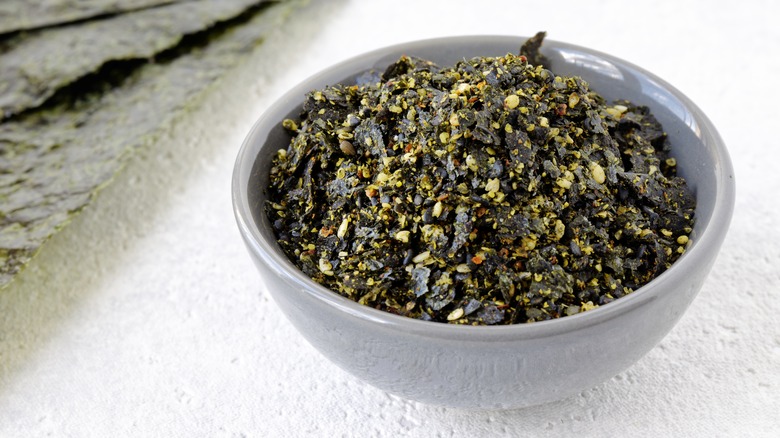Tabitha Brown On The Delicious Vegan Food You Can Find In Her New Cookbook - Exclusive Interview
If you know the name Tabitha Brown, there's a good chance it's because you've seen her on TikTok. The actress, best-selling author, and vegan food star owes her original claim to fame to social media, where she's developed a massive following of millions of fans who are dazzled by her bubbly, down-to-earth personality and her creative (and utterly delicious) vegan recipes. From carrot bacon to jackfruit tacos to creamy mac and cheese, Brown loves to show the world that anything can be vegan, and it can be mouthwatering.
Now, Brown is finding her way into our hearts and kitchens once more with her first cookbook. "Cooking from the Spirit" is packed with easy recipes that everyone around your table will love, whether they're vegan or not.
In an exclusive interview with Tasting Table, Brown shared some of her favorite recipes in the book and opened up about the journey that got her to this point. She also spilled the secrets behind some of her most popular vegan food hacks.
Her journey from social media star to cookbook author
Congratulations on the cookbook and this upcoming tour. What an exciting time.
Oh, my God, I'm so excited. Touring is my favorite thing. I love going to connect with people. I'm a foodie and this is a cookbook, so it's going to be a whole different experience and a whole different kind of fun.
It's certainly been a whirlwind couple of years for you. When you first started getting noticed on social media a few years ago, did you imagine that you'd be here in this moment, right now?
I could have never imagined this. I could have never imagined social media would take me on this journey.
This was one of the first ways that you ever started engaging in connecting with fans about food, through social media. What does this platform mean to you?
It started for me on Facebook. In 2017 is when I started doing cooking videos. I would cook live every day at 5:00, and I organically grew my following. I didn't have a lot of people, but I was consistent. I did it every day.
December 30 of 2017 is when I was driving Uber and ate a sandwich in my car to tell people about it, and that video went viral. That's what took me on the journey of becoming the brand ambassador for Whole Foods at that time, and touring the country for two years, and telling my story about being vegan. It opened so many doors for me for brand deals with plant-based companies. I couldn't believe it. It literally changed my life. Facebook changed my life.
In 2020, I got on TikTok because my daughter kept convincing me I needed to, and that opened the floodgates. In March 2020, I had 500,000 followers on Facebook, and I had 200,000 on Instagram. When I got on TikTok, within five weeks, I had 2 million new followers on that platform alone. All my other platforms started growing nonstop like crazy, and are still growing now. I never, ever could have imagined.
Tabitha Brown says she doesn't consider herself an influencer
Were there any unique challenges you faced along the way as you've built this food career as an influencer?
The first part is [that] I don't consider myself an influencer. I just consider myself a person who happens to have influence. The only challenge is sometimes people, they're not open. That was always my goal — to help people open their minds and see food differently. I never wanted to be a person who felt like I was judging anybody, or that I was trying to force my lifestyle on anybody. If anybody follows me for five minutes or watches any of my videos, they know that's exactly how I live my life. I just share.
I want people to be curious about the food or laugh about it. That's the biggest challenge — wanting people to know that it's all love, and it's fun, and the food is good. I'm vegan, but I ain't just eating salads, let me tell you that.
As you've demonstrated, social media presents such a cool way to showcase unique things that we would never think to try before. Do you ever feel like there have been challenges along the way in terms of being recognized as a legitimate chef versus someone who is just making things on social media?
Yeah. I always tell people — and I've never been shy about it — "I am absolutely nobody's chef." I [haven't been to] culinary school. I'm a woman, a mother, a wife who cooks for her family that people enjoy watching. That's more relatable than a chef who went to school. I can help somebody in the kitchen and tell them, in simple terms, how to do something before a chef who has studied and knows all the terminology and the measurements, all that stuff. That ain't going to be Tab. I can't even get confused with measurements, which is why my cookbook is "Cooking from the Spirit." We're going to trust ourselves in the kitchen — that speaks volumes.
I also want people to know anybody can write a cookbook. My granny pretty much wrote her own cookbook without realizing that's what she was doing. She wrote all her recipes down. That was back in the day when people used to keep the little green box in the kitchen, and they would put the little index cards with all the recipes. I realize now, like, "Wow. She was keeping her recipes," and it was no measurements. Anybody can do it. You don't need the credentials to write a book; you don't have to be a chef to write a cookbook.
Cooking from the Spirit was inspired by Tabitha Brown's family and childhood
You mentioned your granny and those recipes, which I'm sure have had a huge impact on you. Have there been any other people in the food world or mentors who have helped you along the way to get to where you are now?
Honestly, no, other than my family, my mama, my aunts, and my granny, who taught me how to cook over the phone over 20 years ago. I would have to call, and they would walk me through certain things when me and my husband first moved in together, because I did not know my way around a kitchen. I grew up in the country, and I was a tomboy; I was always outside. I didn't think I would ever have to cook when I grew up. I thought I was going to be famous and have a chef at home. I didn't know I was going to turn into the person doing all the cooking.
They are where all of my creativity came from. Then it became trial and error in the kitchen. I would make it up as I go, and I still cook that way now. I don't like to watch other people cook because I never want to be influenced, like I'm taking somebody's recipe. I want to do it my own way.
Where did you draw inspiration for the recipes that you featured in "Cooking from the Spirit"?
All from growing up. A lot of them are Southern favorites, how I grew up in my childhood. You'll see my Mama's Meatloaf, which is one of my favorite things, and Sloppy Joes — things that are traditional all across America and are your normal non-vegan items. My goal was to show people that you could still have your favorites the vegan way.
That's how I started my journey. When we first went vegan in my house for 30 days, the whole family was vegan. My husband's a real Southern man, so I was like, "Lord, I got to figure out how to make his favorites and mine, but I got to make sure he likes it so that he'll eat it, so I [don't have] to keep cooking two meals every day." That's really what it is; it's a lot of those.
It's also inspired by some of my first jobs. I worked at Taco Bell, and some of the things that I used to love to make were Nachos BellGrande or Mexican pizza. I created those the vegan way to show people, "If this is something that you like, I can show you how to do that at home the vegan way." I draw from that. What my family favorites are now is ... My family loves my lasagna. My son loves the cheesecake cups that we make. It's all family, and it's all personal.
The story behind her famous angel eggs
What is the most meaningful recipe to you in this cookbook?
That is very tough. It goes between the mac and cheese or the deviled eggs. I would probably lean more toward ... as I call them, the angel eggs, because they were a staple in my childhood and as I became a mother.
When I was little, my mom used to let me help her with the deviled eggs and I'd sprinkle the paprika on the top. Then that became something that me and my daughter would do. When I became vegan, I thought I lost that. I was like, "Wow, we'll never get to do that again," because it was such a thing. We did it for holidays and everything.
Then I had a dream about this recipe, and I woke up, and I was like, "Tab, that sounds crazy." But in the dream it was good. I did a video and told people, "I dreamt that I made vegan deviled eggs," aka saved eggs or angel eggs. When I did it, I was like, "Oh my God, I get to have this tradition back. I can still do this with my daughter."
Now my son is saying, "We could even do it." I got this back now. It's one of my most popular recipes. It was one that did not exist anywhere in the world, and now people make it all the time.
It's not just vegans who will love Tabitha Brown's recipes
You say in the intro to this book that this is for everyone. This is not just for vegans and people who want to eat vegan.
Absolutely.
There's still a lot of people out there who are pretty skeptical about vegan diets, vegan cooking, and what that looks like. What is the first dish that you would point them to to convert the skeptics?
Probably jackfruit tacos, because a lot of people like the chicken, or they like pulled pork — that type of shredded meat feel. With jackfruit, you can do so many things with it. I also will probably point them to the lasagna because every person who's ever come into my house and I made lasagna, they'd be whispering to me, "Girl, I thought you went vegan."
What is the secret to making it taste that good?
You layer it with flavor. I don't know — it's that people have this mindset. They think that vegan food is bland, or they think it's salads or something. Their mind is blown when they try it, and it's like, "Wait, this is not vegan." I'm like, "Yes, it is vegan."
Have you had more success approaching vegan cooking as, "I'm going to remake things to taste like they have meat in them or aren't vegan"? Or has it been more fun to explore and create brand-new things altogether?
Brand-new things altogether. This cookbook is like when I first started my vegan journey. A lot of my first recipes were to help those cravings and people who are curious and need to know that they can still have some of their favorites without being deprived of them. But now, I love to do anything.
I love food. I'm a foodie. I turn carrots into bacon, but I love any kind of food. I wake up with thoughts in my mind, like, "I wonder if I should make some chickpea patties today," making up stuff. It's fun both ways.
The secret to Tabitha Brown's viral carrot bacon
I have to ask you about carrot bacon — this is one of your claims to fame. Did you ever expect it to blow up like it did?
Never. I had made it before. That's the crazy thing. I did a video before and it did all right, but when TikTok got a hold of it, they were like, "Girl, this is genius." I'm like, "But I've done this before. Six months ago, nobody cared."
The world was in the mood for carrot bacon.
They were in the mood and in the pandemic, and they were like, "Okay, we need it."
If we want to make this at home, what's the secret to getting it perfect every time?
It's the air fryer. That air fryer makes it crispy — but also that little bit of maple syrup, that little bit of liquid smoke. You can only put a little bit of liquid smoke, not too much, because you'll ruin it. That little bit of that sweetness and smokiness is what gives you that bacon flavor.
That's the thing about real bacon. People think that they crave bacon for the thought of bacon, but it's really the flavor and the texture. That's it. If you can get the same flavor and the same texture, then you've got bacon. That's why you can pretty much bacon-ize anything, as long as you get the texture right and you get the flavor right ... and you tell yourself it's bacon.
How to master vegan mac and cheese, according to Tabitha Brown
You mentioned your mac and cheese earlier. How long did it take you to get that recipe right?
I was making this mac and cheese before I went vegan because I'm allergic to dairy. I had mastered the mac and cheese over the years. I have a couple of different mac and cheese recipes.
What's the key to getting good flavor in a mac and cheese without using any dairy products?
It depends on how you want to do it. If you want to create your own cheese, you're going to have to use nutritional yeast, carrots, potatoes, and cashews to make a really good vegan cheese. Now, there's so many amazing ones you can buy at the store that are made with chickpeas, or they're made with almonds, or they're made with cashews.
I have to have different kinds of cheese — a little bit of sharp, a little bit of medium, maybe a little bit of mozzarella, mix them on up in there. Always season the cheese with a little garlic powder. You got your little herbs and spices in there so that it heightens the flavor. Then [add] a little bit of butternut squash, because it gives it the color of cheese, that rich orange look, but it also adds that heightened flavor of a little bit of sweetness to go with the savory.
Tabitha Brown teases her vegan Thanksgiving table
We're getting closer to the holiday season. You feature a delicious-looking Thanksgiving dressing recipe in your book that we found intriguing — it got us wondering about what vegan Thanksgiving looks like.
At my house, vegan Thanksgiving, you don't know it's vegan. The only thing is you don't see a big turkey.
What's the main event?
Sometimes we'll do a tofurkey. There's a lot of different vegan Turkey options. I'll do a meatloaf, or I'll do mushrooms and gravy, and I'll still have my greens. I'll still have my yams. I'll have my mac and cheese. I'll have my potato salad, the cranberry sauce, the stuffing, the dressing — all of the things that you have at a traditional Thanksgiving. They're going to still be on my table, other than the turkey.
Are there any staple ingredients that you need to rock a vegan Thanksgiving?
Real food, right? Everybody eats candied yams for Thanksgiving, so you have those. You have your greens. I love kale, and we like collard greens as well. Everybody in the South has to have a good mac and cheese at the holidays. For a vegan mac and cheese, you have to make sure you have your oat milk, or your cashew milk, and then your vegan cheese options. But my key ingredient for mine — because I love a little sweet addition to my mac and cheese — is butternut squash. That's also giving you very Thanksgiving feels.
What are some of your other favorite vegan dishes for the fall season — desserts, entrées, or otherwise?
I don't do desserts, really. Desserts ain't in my ministry. God didn't give that gift. He gave that to my granny and my sister and my mama, but he did not give it to me.
I love soups; I love chili. I have my chili in the book. I love a broccoli cheddar soup, and the mac and cheese — again, it's comfort food. Those are the things that you enjoy during the warm cozy nights when you've got the fireplace on, you want a blanket, and you want cozy food during the holidays and during the winter months.
Tabitha Brown reveals her vegan cooking fails
You mentioned that you've done a lot of trial and error over the years as you've developed all of these vegan recipes that you make for your family. Have you had any that wildly did not work?
I tried to make some barbecue tempeh ribs. Disaster.
How come it didn't work out?
I was still very new to the journey. I was cooking live, and it was so funny because I told this all the way up. I tried to boil it like you would do regular ribs back in the day. I was like, "Okay, you can boil it a little bit, tenderize it." It fell apart. It was not good. Even the first time I tried jackfruit, I hated it. I was like, "This is not it." But then I had to learn to cook it my way and perfect it.
I even cooked watermelon, because that was a thing, years ago. People were saying, "Have you heard about this watermelon you can make like ham?" I was like, "What?" I did that again. I did that live — hated it. It was terrible.
I have absolutely had a lot of things that didn't work. What I've realized over the years is I'm going to stick to the things that I know that I love, the ingredients that I know that I love, and have fun that way. But you have to try new things to discover what you love anyway.
Tabitha Brown's favorite vegan ingredients
Do you have any underrated or lesser-known vegan ingredients that you're always turning to?
Nori furikake. I talk about this a lot in the book, too, and I feel like I've made it very popular. But it's a seaweed and sesame seasoning that makes things taste like fish. I add it to my vallops, as I call them, which is oyster mushrooms or king trumpet mushrooms to make vegan scallops. I also add it to my chickpea tuna salad or un-tuna salad. It gives you that flavor of seafood.
Another ingredient is black salt, which isn't black; it's a light pink. Black salt makes things taste like eggs. You only need a pinch. This is an Indian salt. It's an actual salt. It's called black salt, but it's really pink and you can smell it. It smells like sulfur. It smells like eggs. I actually use this in the deviled egg recipe. I put a pinch of the black salt even in my pickle juice so that when I soak my mushrooms, it gives them a pickled egg flavor. Black salt is a game-changer.
Click here to get your copy of Tabitha Brown's cookbook, "Cooking from the Spirit."
This interview has been edited for clarity.
